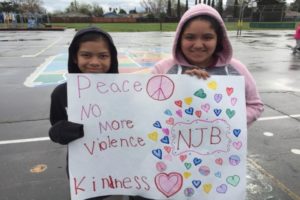More than a dozen students at Carolina Forest High school recently received an in-depth, real-world education in history and the U.S. Constitution, an experience several said taught them a lot about themselves, as well.


More than a dozen students at Carolina Forest High school recently received an in-depth, real-world education in history and the U.S. Constitution, an experience several said taught them a lot about themselves, as well.
In February, 14 students in JJ Iagulli’s advanced placement government class took second place in the statewide “We the People: The Citizen and the Constitution” competition—a mock congressional hearing in which students are expected to defend their answers with American history and constitutional law.
Ilagulli explained the process to My Horry News:
Students get questions and they write a prepared response of no more than four minutes to each of them. The panel of students is sitting before the judges, and after the four minutes, there is a six-minute follow-up segment where the students cannot use notes or prompts, and the judges ask any follow-up questions they want to.
Ilaguilli said that unlike a real congressional hearing, where one person is on the spot, the student competition encourages a full panel of students to chime in.
“There are points for participation, so even if the judge directs a question to a particular student, it is the responsibility of the group to add information or even disagree with the student that was called on,” he said.
Student Kareem Barbis told the news site that the dynamic of working on a team with students from different backgrounds was a new experience.
“Usually I get to choose my group and my partners, but the teacher assigned that, and it was interesting working with people different from me, people with different personalities,” she said.
Sandra Ataalla, Barbis’ classmate, contends the competition boosted her confidence.
“I had a better voice at the end of the competition,” she said. “I can take an opinion and back it up with evidence now. I used to be shy, but I’m more outspoken now.”
Cassidy Callaghan, another student, said the competition improved her research and communication skills.
“This is going to help me with job interviews, because now I can communicate with someone better and answer questions better,” she said. “We had no idea what they would ask, or what they would think about our speeches.”
Carolina Forest High School ultimately aced three out of six units at the competition, coming in second to Lexington’s River Bluff High School. River Bluff will now represent South Carolina in the national finals in Washington, D.C., in April.
“These kids can research, they understand the issue at hand, they can analyze it and synthesize and create a solution that often recognizes not just the complexity of the issue, but even the legal and constitutional requirements, even the founders’ intentions,” Iagulli said.
“They learn to create an argument they can back up with facts, and those things are beneficial no matter what field the students go into,” he said.
The Institute for Advanced Studies in Culture at the University of Virginia recently examined the role schools play in forming character in students, and effective ways a wide variety of schools influence civic responsibility and other values.
The School Cultures and Student Formation Project, summarized in The Content of Their Character, centers on the question:
What is the path and process by which children are formed as well-integrated individuals who are caring, honest, and trustworthy—healthy human beings living virtuous and meaningful lives as civically minded and committed members of a just community?
“The moral and missional ethos of a school was reinforced through a range of practices or routinized actions—some formal, some informal—all oriented toward giving expression to the school’s beliefs and values,” editors James Davison Hunter and Ryan S. Olson wrote.
The time, energy, and curricular alignment at Carolina Forest High School all communicate to students the importance of understanding the Constitution, being able to construct a valid argument, and working well with others. These all shape the knowledge, skills, and dispositions of good citizens.
The We the People competition is run by the Center for Civic Education, which offers lesson plans and other resources for educators.
The 31st Annual We the People National Finals—featuring more than 1,200 high school students from 56 classes across the nation—will take place at the National Conference Center over April 27-May 1, 2018.